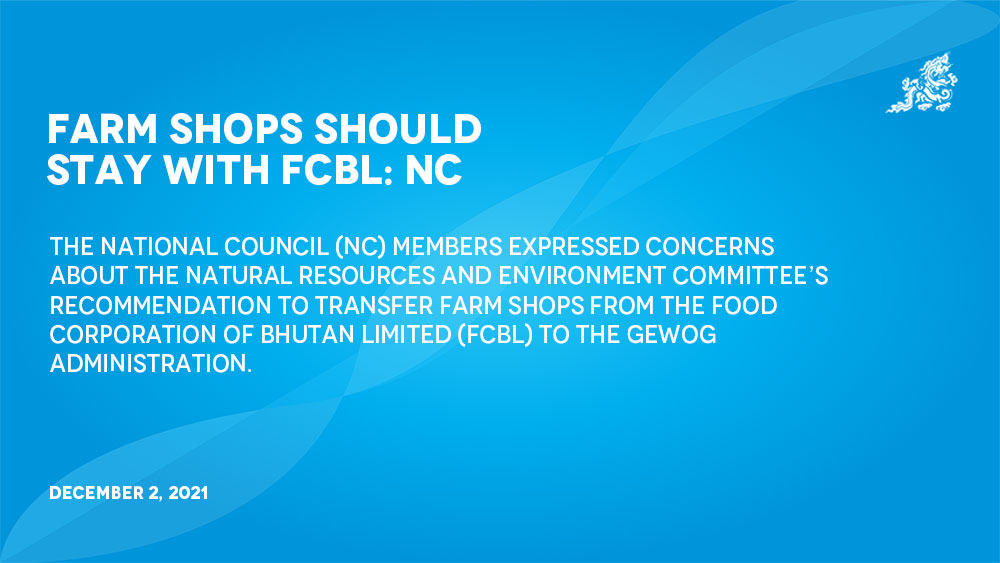Chhimi Dema
The National Council (NC) members expressed concerns about the Natural Resources and Environment Committee’s recommendation to transfer farm shops from the Food Corporation of Bhutan Limited (FCBL) to the gewog administration.
The committee made the recommendation after reviewing the state-owned enterprises (SOEs) under the Ministry of Finance.
The chairperson of the committee, Tirtha Man Rai, said they conducted the review to understand the operation and management of SOEs for effective and efficient service delivery. “The FCBL’s farm shops have helped farmers, but also incurred losses.”
He said the committee recommends that the government explore the possibilities of transferring the farm shop to the gewog and make it viable by incorporating farm input and a product marketing channel system.
The farm shops were established in 2014 to provide buy-back facilities to the farmers and sell essential food items at affordable prices.
Out of the 173 farm shops established initially, 53 closed, 13 shops are franchised, and 107 shops are still currently operational.
The farm shops have incurred a loss of Nu 107.32 million from 2016 to 2020, although they made profits from 2014 to 2016.
Tashigang’s NC member, Lhatu, said there should be a feasibility study to ensure the gewog administration has the capacity to operate the farm shops. “The FCBL has been operating for years and they have the resources and capacity for marketing.”
He said gewog administrations have the responsibility of carrying out developmental activities and the additional responsibility might burden them.
Sarpang’s NC member, Anand Rai, said the FCBL receives subsidies from the government. “If the FCBL failed, it would be challenging for the gewog administration to succeed.”
Pemagatshel’s NC member, Choining Dorji, said farm shops would help with employment.
He said that even if the government operates the farm shops, it would require investment. “It is convenient for the FCBL to operate the shops with the government’s support, rather than the government taking over them.”
Some members said that for the benefit of the people, the closed farm shops should be reopened and studies should be conducted to study why farm shops incurred losses.
Trongsa’s member, Tashi Samdrup, who is a committee member, said that the committee is asking the government to look for possibilities and assess if they can take it over. “If there aren’t possibilities for the government to operate them, the FCBL can continue.”
Meanwhile, there are 38 SOEs in operation today, out of which 14 are under the Ministry of Finance and 22 SOEs are under Druk Holding Investments.
The committee presented five recommendations.
The first recommendation is to reform SOEs.
The committee recommended that the government strengthen the existing commercially oriented SOEs and privatise them.
It recommended the establishment of Petroleum, Oil, Lubricant (POL) stations at appropriate locations to stimulate rural development, the possibility of waiving a certain portion of non-performing loans (NPL) outstanding related to the Revolving Fund I and II for agriculture and livestock production, and an NPL reduction strategy scheme.
It recommended the development and implementation of the charter or bylaws as per the Information, Communication and Media Act of Bhutan 2018 for the smooth operation of the Bhutan Broadcasting Service Limited.
To avoid complex compliance and maintain corporate social responsibility, the committee recommended harmonising the Corporate Governance Guidelines 2019 of the Ministry of Finance, and Corporate Governance Rules and Regulations 2020.
The House will adopt the recommendations after incorporating changes.
Edited by Tashi Dema


